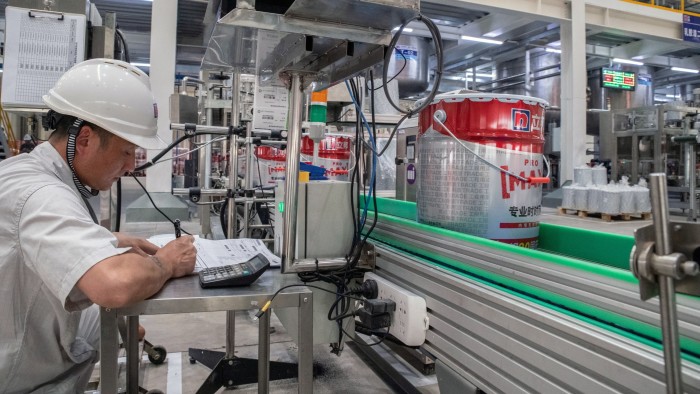Unlock the Editor’s Digest for free
Roula Khalaf, Editor of the FT, selects her favourite stories in this weekly newsletter.
The EU, a political project conceived to remove trade barriers, has been raising tariff walls at its fastest rate in 15 years. But just as fast as the defences are built against cheap Chinese imports, fresh storms blow the bloc off balance again.
Donald Trump’s threat to impose levies of up to 60 per cent on everything Chinese would, for instance, put an even higher tariff wall around the US than anything the EU has planned.
The effect, if the US president does follow through, would be to divert Chinese goods from the US to the EU — forcing Brussels to in turn consider hitting back with even tougher defensive measures.
It is an impossible situation for a union that has taken pride in its free trading instincts. Every barrier it erects can save some domestic jobs, but will also reduce the competitiveness of other domestic industries by raising the price of imports.
With China now accounting for 30 per cent of global industrial output, the ripple effects will be considerable on EU products ranging from electric vehicles to Italian tomato paste.
Vulnerable industries, such as steel and glass fibre makers, complain the EU has not been building trade defences fast enough or high enough to save them. “We are close to a tipping point for many industries,” said Laurent Ruessmann, a partner with RB Legal and trade defence expert.
On the other hand, those who want cheap Chinese inputs to keep their own product prices down, such as paint makers, have lobbied against measures. The EU has put duties on titanium dioxide, a key ingredient, leaving paint makers worried they will have to absorb the cost or lose sales.
Simon Evenett, professor of geopolitics and strategy at IMD Business School, said tariffs always end up costing consumers or other businesses.
“Europe’s dilemma is either to sacrifice jobs downstream by slapping tariffs on Chinese imports or watch EU producers shrink by doing nothing. When it comes to protectionism someone’s ox always gets gored.”
However, Aegis, which represents heavy industries such as steel and chemicals, argued that the EU is sitting on the fence.
Trade defence measures cover far less of its EU imports than other trading blocs, according to Aegis. The number of tariffs has grown to their highest level since 2009, with 141 in force in 2023. But rebased against total imports, the US, Australia and Canada have more than 10 times bigger protective shields.
“Claims that EU manufacturers use trade defence as a protectionist tool do not stand up to scrutiny,” it said in a report.
Brussels has responded. In a move asked for by Aegis, it now automatically registers imports when a trade investigation is opened. It can then backdate tariffs if it wishes, deterring stockpiling during the months-long probe to beat the price rises.
But even with tariffs in place, China has tended to find ways around them.
Since the EU put antisubsidy duties in 2010 on glass fibre — used in construction, wind turbines and other industries — Chinese producers have doubled their market share.
After the tariffs were imposed, imports started surging from Egypt. China’s state-owned Jushi had opened a plant there, and Brussels eventually put tariffs on Egypt too.
Ludovic Piraux, chief executive of producer 3B and president of Glass Fibre Europe, said the tariffs were ultimately too low. “Companies operating within a market economy like ours cannot withstand the relentless attacks from Chinese state-subsidised competitors,” he said.
The steel industry is feeling the squeeze most — hobbled by weak demand, high energy costs and regulation forcing it to invest to eliminate carbon emissions.
Steel production hit its lowest ever in 2023, 128mn tonnes, according to Eurofer, the lobby group. Trump slapped tariffs on the metal in his first term to protect his voters in the industrial heartland of the US — and could reactivate them within days of his return.
Axel Eggert, Eurofer director-general, said: “We have to decide if we want a European steel industry or not.”
Carmakers — themselves now partially protected by tariffs from a surge of cheap, allegedly subsidised Chinese electric vehicle imports — need EU steel, Eggert argued. While they might be tempted by cheaper Chinese offerings to lower their costs, “as soon as we are gone, the Chinese will raise prices”.
The EU might be tempted to reopen talks with the US on a “green steel club”, which would allow tariff free trade between members while those outside pay.
This was once dismissed by Brussels as incompatible with World Trade Organization rules. But senior EU officials now hint that they could be flexible in interpreting the rules. In this hostile environment, even good students of trade multilateralism may find it impossible to stick to their principles.
Read the full article here




